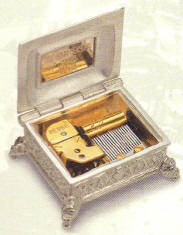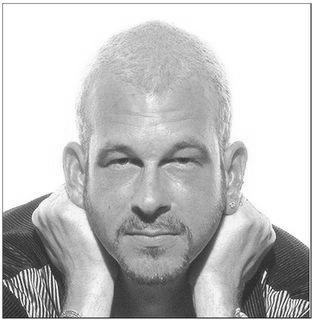Anatomy Of A Song #7: The Broken Music Box
 This evening's session for "I Could Try" has been fruitful and painstaking. My plan was to post a couple of audio snippets that would illustrate points of arrangement and composition that I have referred to on several occasions during the project. These will have to wait until tomorrow as I've used up my entire schedule with overdubs and in the conceptualization and partial creation of a playful little conceit that will hopefully provide "I Could Try" with an interesting little moment of theatre.
This evening's session for "I Could Try" has been fruitful and painstaking. My plan was to post a couple of audio snippets that would illustrate points of arrangement and composition that I have referred to on several occasions during the project. These will have to wait until tomorrow as I've used up my entire schedule with overdubs and in the conceptualization and partial creation of a playful little conceit that will hopefully provide "I Could Try" with an interesting little moment of theatre.First our overdubs: tonight began with some organization and tracksmanship to prepare our aural canvas for the next few coats of paint. Yesterday's Fender Rhodes and bass guitar overdubs have been consolidated and combined. I've done some minimal comping and editing and I've thrown up a rough mix to make sure that I'm not cornering the real estate in certain frequency ranges that will need to be carefully fenced off for vocal overdubs, guitars and solos. The Rhodes is a wonderful rhythm instrument in that it has an extremely mellow, thick tone that never competes with a vocal in a mix. As detailed in last night's entry I've recorded this take of Rhodes with a bright, bell-like eq that hypes the upper treble in the 10,ooo hz range and I must be cautious not to overwhelm the top end of the mix with it.
Controlling treble is a fairly simple game; in the analog days I used to record certain sources with very hyped-up treble. This gave me the ability to dial the treble out in the mix which had the effect of dialing out tape hiss. Handy. The slightly exaggerated treble of the Rhodes piano will have to be watched carefully, especially since a stereo mix will be done in the next session or two which will lock the rhythm instruments together for the duration.
I proceeded this evening with a couple of time-consuming overdubs, beginning with organ. I used a vintage sounding, almost Chamberlin-ish organ patch, running it through the computer and PatchMix DSP's beautiful Leslie speaker emulator. I worked the Leslie on the fly, switching from Off to Slow To Fast for different passages. I worked piecemeal with the organ overdubs as I was essentially composing the part as a I went. I forewent organ in sections that will be thick with background vocals so as not to obscure them, as organ pads and vocal pads share many of the same frequencies and can argue amongst themselves to the detriment of the soundstage.
After this I spent a few hours composing and overdubbing piano. I used a dark, dry piano patch and equalized the typically hyped tone of the digital piano down to sound less "ideal". Piano is a cantankerous instrument in the analog realm and the tone typically contains a "push" in the midrange that digital emulations tend to smooth over and tame. Hence, unless judiciously eq'd (always being careful not to create phase cancellations over the stereo image) digital piano can sound like unmitigated ass.
Not so this time around- the piano goes down big and pushy and thunky and imperfect, the way it should be. The parts turn out very cool; I've mostly bolstered the Rhodes part and accentuated key passages and widened chords. I've recorded just enough extemporaneous fills and chordal hooks to make it interesting, still playing towards the goal of a rhythm bed that never fights the lead vocal but rather supports, echoes and answers to it.
I have an odd habit of "casting" a recording: at the beginning of the process I decide who of the musicians in the "ensemble" is the singer and perform "his" instrumental overdubs with this in mind. In the case of "I Could Try" our singer is playing piano and hence is never complicated during vocal passages nor moves in ways contrary to the vocal.
Anyway, I'm very happy with the piano overdubs. They should sit quite comfortably with the Rhodes, re-inverting and "lengthening" many of the chords in a rich and agreeable way.
Tonight I hit on "The Broken Music Box". It's an extremely cool idea. I've spoken of "stuttering" into the chorus modulation from A major to C major a few times in previous posts, and while it was always highly conceptual I knew I would hit on the "right" way to do it as the song came together. I had thought of recording the four-bar "fake" chorus that precedes the big modulated chorus as a bit of an old 45 with comb-filtered eq and record crackles, but discarded this as overdone.
I decided instead to emulate an old music box playing the four chords of the "fake" chorus" and overdub the vocal with an old-timey tone. I arranged a music box pattern (my Alesis QS6.1 has a great music box patch) that sounded authentic to my ears and recorded this as two separate lines. This was lovely but too smooth- it lacked the "stutter" I keep hearing, like an engine skipping as it approaches 4th gear. It's difficult to describe; I wanted a brief falling sensation to preceded the glorious key change like a twin-engine plane hitting some bad gas and losing altitude before righting itself. Ringo would understand.
Then it dawned on me: what if the music box were to break as it reached the conclusion of the two-bar phrase? Eureka! And Eureka again! The Third Wall crashes down! Artistic nirvana! So what we end up with is a sprightly little motif struck up on a little Swiss marvel but at the second beat of the second measure a spring snaps dramatically and the motif goes haywire, distressing and speeding up and dying with a clunk and then BANG! The big chorus in C crashes in!
It's never been done! This will be "I Could Try"'s little burst of "I Feel Fine" feedback and if all goes according to plan it will be seamless, a fun little Smile Moment.
Tomorrow I will post these snippets that will clear up some points and terminology for the un-studio-savvy. I'll use a site that is typically accessible by Mac and PC platforms.
And now to bed. The final moments before sleep are some of the most fertile in musical arranging when no worthwhile worries present themselves. Strange, when I'm in sunk deep in a worthwhile recording project my ever-present insignificance and overall lackingness are backburnered. To sleep, perchance to dream. About naked sylphs and suchwhat.


1 Comments:
"Dreams....they complicate my life-fah-fah.."
Post a Comment
<< Home